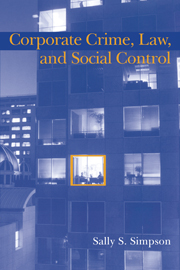Book contents
- Frontmatter
- Contents
- Preface
- 1 Criminalizing the Corporate Control Process
- 2 Deterrence in Review
- 3 Assessing the Failure of Corporate Deterrence and Criminal Justice
- 4 Corporate Deterrence and Civil Justice
- 5 Corporate Deterrence and Regulatory Justice
- 6 Cooperative Models of Corporate Compliance: Alternatives to Criminalization
- 7 Criminalization versus Cooperation: An Empirical Test
- 8 Shaping the Contours of Control
- Appendix A Study One: Questionnaire Items and Responses
- Appendix B Study One: Sample Characteristics
- Appendix C Study Two: Questionnaire Items and Responses
- Appendix D Study Two: Sample Characteristics
- Name Index
- Subject Index
6 - Cooperative Models of Corporate Compliance: Alternatives to Criminalization
Published online by Cambridge University Press: 10 December 2009
- Frontmatter
- Contents
- Preface
- 1 Criminalizing the Corporate Control Process
- 2 Deterrence in Review
- 3 Assessing the Failure of Corporate Deterrence and Criminal Justice
- 4 Corporate Deterrence and Civil Justice
- 5 Corporate Deterrence and Regulatory Justice
- 6 Cooperative Models of Corporate Compliance: Alternatives to Criminalization
- 7 Criminalization versus Cooperation: An Empirical Test
- 8 Shaping the Contours of Control
- Appendix A Study One: Questionnaire Items and Responses
- Appendix B Study One: Sample Characteristics
- Appendix C Study Two: Questionnaire Items and Responses
- Appendix D Study Two: Sample Characteristics
- Name Index
- Subject Index
Summary
subjecting corporations and corporate managers to greater and harsher criminal law will not produce the kind of deterrent effect that is generally assumed. In fact, our review suggests that criminalization may even backfire by producing hostility and resistence to law within firms. Recall that one of the key assumptions of a deterrence argument is that fear of punishment is what produces law-abiding behavior. If companies (or, more accurately, their personnel) do not fear, fail to consider, discount, or disparage formal legal sanctions, deterrence will not be achieved. Yet advocates of criminalization suggest that deterrence fails because of implementation deficiencies.
The fact that increasing the number and severity of criminal laws has not provided better control over corporate crime is explained by focusing on insufficient utilization. If criminal sanctions were to be deployed regularly, if corporations knew that their chances of escaping criminal conviction were slight, if fines commensurate with the size of the firm and the profitability of the crime were imposed, if jail sentences were given, if these procedures were coupled with more enforcement personnel and more punitive laws, backed by civil and administrative remedies where appropriate, then criminalization and deterrence would be effective.
As this quotation illustrates, deterrence defenders recommend ratcheting up the amount of punishment instead of reconsidering how best to achieve corporate compliance. It has been difficult for policy makers, politicians, and the general public to step out of the “deterrence trap” – a step that is necessary to consider seriously alternative methods of crime control.
- Type
- Chapter
- Information
- Corporate Crime, Law, and Social Control , pp. 98 - 115Publisher: Cambridge University PressPrint publication year: 2002



